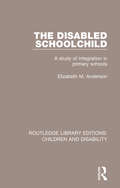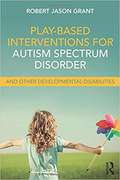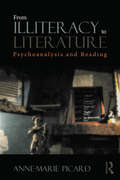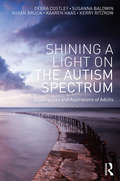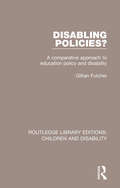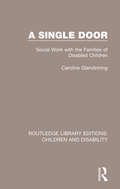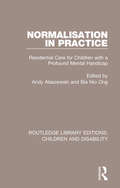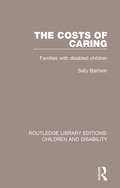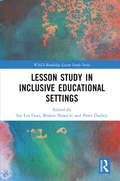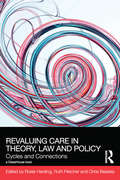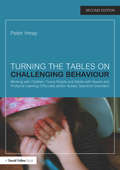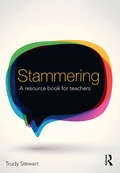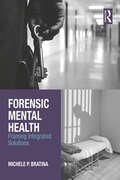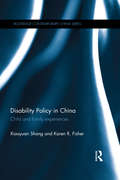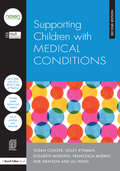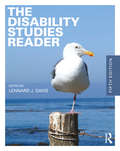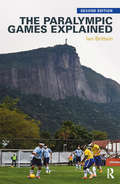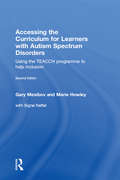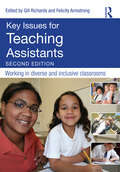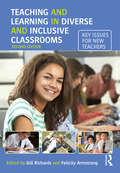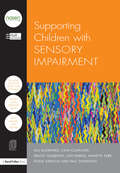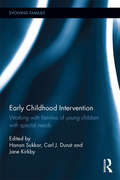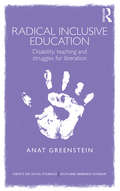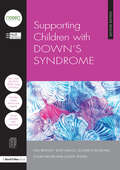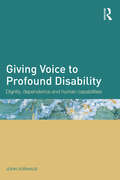- Table View
- List View
The Disabled Schoolchild: A Study of Integration in Primary Schools (Routledge Library Editions: Children and Disability #2)
by Anderson Elizabeth M.First published in 1973, this book considers the differences between mainstream schools and special educational needs schools, for children with learning disabilities. It contains a wealth of research data, case history material and reference to existing literature, designed to answer many questions which parents, heads, and schoolteachers have asked. Questions considered include whether children with disabilities do as well in ordinary schools as children without, whether they are as happy and well adjusted, and how they fit into the social structure of the class. The book also looks at whether much teasing occurs and how practical difficulties can be overcome.
Play-Based Interventions for Autism Spectrum Disorder and Other Developmental Disabilities
by Robert Jason GrantPlay-Based Interventions for Autism Spectrum Disorder and Other Developmental Disabilities contains a wide selection of play therapy interventions for use with children and adolescents with autism spectrum disorders, dysregulation issues, or other neurodevelopmental disorders. <P><P>The structured interventions focus on improvement in social skills, emotional regulation, connection and relationship development, and anxiety reduction. Special considerations for implementing structured interventions and an intervention tracking sheet are also presented. <P><P>This valuable tool is a must have for both professionals and parents working on skill development with these populations.
From Illiteracy to Literature: Psychoanalysis and Reading
by Anne-Marie PicardFrom Illiteracy to Literature presents innovative material based on research with ‘non-reading’ children and re-examines the complex relationship between psychoanalysis and literature, through the lens of the psychical significance of reading: the forgotten adventure of our coming to reading. Anne-Marie Picard draws on two specific fields of interest: firstly the wish to understand the nature of literariness or the "literary effect", i.e. the pleasures (and frustrations) we derive from reading; secondly research on reading pathologies carried out at St Anne’s Hospital, Paris. The author uses clinical observations of non-reading children to answer literary questions about the reading experience, using psychoanalytic theory as a conceptual framework. The notion that reading difficulties or phobias should be seen as a symptom in the psychoanalytic sense, allows Picard to shed light on both clinical vignettes taken from children’s case histories and reading scenes from literary texts. Children experiencing difficulties in learning to read highlight the imaginary stakes of the confrontation with the arbitrary nature of the letter and the "price to pay" for one’s entrance into the Symbolic. Picard applies the lesson "taught" by these children to a series of key literary texts featuring, at their very core, this confrontation with the signifier, with the written code itself.. This book argues that there is something in literature that drives us back, again and again, to the loss we have suffered as human beings, to what we had to undergo to become human: our subjection to the common place of language. Picard shows complex Lacanian concepts "at work" in the field of reading pathologies, emphasizing close reading and a clinical attention to the "letter" of the texts, far from the "psychobiographical" attempts at psychologizing literary authors. From Illiteracy to Literature presents a novel psychodynamic approach that will be of great interest to psychotherapists and language pathologists, appealing to literary scholars and those interested in the process of reading and "literariness."
Shining a Light on the Autism Spectrum: Experiences and Aspirations of Adults
by Debra Costley Susanna Baldwin Susan Bruck Kaaren Haas Kerry RitzrowProduced in conjunction with Autism Spectrum Australia (Aspect), Australia’s largest provider of services with people on the autism spectrum, this new text explores the experiences, needs and aspirations of adults on the spectrum. The volume utilises the structure of a recent survey (the only one of its type in Australia and one of few conducted internationally) and presents data from the study with contributions from adults on the spectrum to illustrate the findings with first person accounts and case studies. By drawing on these unique experiences, this valuable resource is presented in a way that will be both engaging and accessible for a wide range of readers.
Disabling Policies?: A Comparative Approach to Education Policy and Disability (Routledge Library Editions: Children and Disability #7)
by Gillian FulcherFirst published in 1989, this book is about integrating or mainstreaming policies, looking specifically at how to improve circumstances for schoolchildren with disabilities or handicaps, and their teachers. The author draws on her experiences, both within and outside the academic institution, to conceptualise and theorise policy, so as to place this policy in a political framework and locate it in a wider model of social life. This model is then used to disentangle the nature and effects of policy practices surrounding integration and mainstreaming, looking at practice in various parts of Europe, the US and Australia, at that time. Although written at the end of the 1980s, this book discusses topics that are still relevant today.
A Single Door: Social Work with the Families of Disabled Children (Routledge Library Editions: Children and Disability #Vol. 8)
by Caroline GlendinningFirst published in 1986, this study explores the increased public concern with policies of ‘community care’ and their effects on informal carers, at that time. It looks at the widespread evidence that one particular group of informal carers- parents looking after their severely disabled child- lack information, advice and a co-ordinated pattern of supporting services. The author, who carried out research on disabled children and their families for a number of years, describes in detail a low-cost experimental project in which specialist social workers set out to remedy these shortcomings. Drawing on the results of this particular study, the author argues strongly for widespread assignment of ‘key’ social workers to this and other groups of informal carers. Despite being written in the mid-1980s, this book discusses topic that will still be of interest and use today.
Normalisation in Practice: Residential Care for Children with a Profound Mental Handicap (Routledge Library Editions: Children and Disability #Vol. 1)
by Andy Alaszewski Pauline Bn OngFirst published in 1990, this book was the first informed study to focus on care within the voluntary sector. Written with the child in mind, it is a sensitive work which explores the administration, strategy, and problems facing carers in children’s homes, at that time. <P><P>Centring on small, community-based facilities, the authors discuss the processes involved in setting up and running such facilities. They examine the difficulties of evaluating progressive services that are influenced by the philosophy of normalisation, and highlight the lessons from which other providers of services are able to learn. <P><P>Written by experienced researchers with contributions from service managers, Normalisation in Practice offers pragmatic advice on managing innovation efficiently without neglecting the needs of the child. Detailed interviews are combined with theoretical insight to provide an important guide for students and practitioners and a model for academics undertaking evaluative research. Although written at the start of the 1990s, this book contains discussions and material that are still very relevant to the subject today.
The Costs of Caring: Families with Disabled Children (Routledge Library Editions: Children and Disability #4)
by Sally BaldwinFirst published in 1985, this book considers the financial consequences of parents and other relatives caring for severely disabled children at home. At the time of publication little reliable information was available on the costs incurred by ‘informal carers’, which this book set to rectify. The volume interweaves hard statistical material about money with the detailed personal responses of parents. It examines the claim that disablement in a child reduces parents’ earnings while simultaneously creating an extra expense. The author compares the incomes and expenditure patterns of more than 500 families with disabled children and 700 control families of the time showing that the financial effects of disablement in a child can be far-reaching and pervasive. This book discusses contemporary policy implications of these findings in a chapter dealing with the rational for compensating families with disabled children, and in the final chapter. Although the book was original published in 1985, it references issues that are still important today and, whilst its main concern is families with disabled children, it will also be useful to anyone caring for other kinds of dependent people, such as the elderly.
Lesson Study in Inclusive Educational Settings (WALS-Routledge Lesson Study Series)
by Sui Lin GoeiLesson Study has been shown to be a systematic way of building teachers’ knowledge by allowing them to share their knowledge with each other. While much has been written about the benefits of Lesson Study in science and mathematics education, this book analyses its impact on education for children with special needs. It studies the ways in which the Lesson Study process is implemented in different educational contexts in the Netherlands, Singapore, the UK, and Sweden—countries which propagate more inclusive learning environments regardless of varying degrees of student capacities. In addition to making transcultural comparisons regarding concepts, procedures, and instruments in the use of Lesson Study in these four countries, this book will provide practice-based suggestions for teachers to formulate collaborative lesson plans.
ReValuing Care in Theory, Law and Policy: Cycles and Connections (Social Justice)
by Chris Beasley Rosie Harding Ruth FletcherCare is central to life, and yet is all too often undervalued, taken for granted, and hidden from view. This collection of fourteen substantive and highly innovative essays, along with its insightful introduction, seeks to explore the different dimensions of care that shape social, legal and political contexts. It addresses these dimensions in four key ways. First, the contributions expand contemporary theoretical understandings of the value of care, by reflecting upon established conceptual approaches (such as the ‘ethics of care’) and developing new ways of using and understanding this concept. Second, the chapters draw on a wide range of methods, from doctrinal scholarship through ethnographic, empirical and biographical research methodologies. Third, the book enlarges the usual subjects of care research, by expanding its analysis beyond the more typical focus on familial interconnection to include professional care contexts, care by strangers and care for and about animals. Finally, the collection draws on contributions from academics working in Europe and Australia, across law, anthropology, gender studies, politics, psychology and sociology. By highlighting the points of connection and tension between these diverse international and disciplinary perspectives, this book outlines a new and nuanced approach to care, exploring contemporary understandings of care across law, the social sciences and humanities.
Turning the Tables on Challenging Behaviour: Working with Children, Young People and Adults with Severe and Profound Learning Difficulties and/or Autistic Spectrum Disorders
by Peter ImrayFully updated, and with new sections on behaviourism, attachment disorders, neuro-scientific developments and working with dis-engaged learners, this second edition of Turning the Tables contains real-life case studies, strategies for identification and handy hints and tips throughout. It is the authoritative guide to tackling challenging behaviour and working effectively with children, young people and adults with severe learning difficulties (SLD), profound and multiple learning difficulties (PMLD) and those on the autistic spectrum with a dual ASD and learning difficulties diagnosis. With a unique approach, the author stresses the need to diagnose not only the correct difficulty but the degree of learning difficulty for a lasting resolution, as well as tackling common behavioural problems such as attention needing and task avoidance. Chapters are split into three specific areas, SLD, PMLD and ASD/SLD, covering: the 'Magnificent Seven' fundamental principles of challenging behaviour strategies for correct identification of the main area of learning difficulty improving teaching methods and strategies to resolve challenging behaviour, including handy hints and tips when things don’t go to plan extensive use of real case studies to illustrate strategies for resolution guidance on writing your own Behaviour Support Plan. This is a practical and authoritative guide to dealing with the myriad of challenging behaviours that constantly puzzle practitioners. It is an essential read for all professionals, parents and carers working with children, young people and adults with SLD, SLD/ASD and PMLD.
Stammering: A resource book for teachers (Overcoming Common Problems Ser.)
by Trudy StewartWhat is stammering? How does it present itself? When does it occur? Why does it happen? What are the most effective strategies you can use to help? Providing background information about stammering as well as a wide range of tools and strategies, this practical book addresses the key challenges faced at nursery and school. There are separate sections on early years, primary and secondary level and include the most common areas that teachers must consider when supporting children who lack speech fluency, including: identifying children at risk of developing a stammer how to manage incidents of stammering how to manage classroom communication and oral participation helping children to make and maintain relationships help children to manage feelings associated with stammering working alongside speech and language therapists. Recent changes to the curriculum means that there is now a greater demand on children’s communication skills than ever. This book will help you provide the necessary support to a child who stammers by offering a clear explanation of the presentation of stammering and the best ways you manage the occurrence of stammering in a range of school contexts. Full of tips and advice this book will enable teachers and other professionals to work effectively with a child who stammers. This accessible book is essential for anyone concerned about a child in their care who presents with a stammer, including teachers, student teachers, SENCOs and parents.
Forensic Mental Health: Framing Integrated Solutions
by Michele P. BratinaForensic Mental Health: Framing Integrated Solutions describes a criminal justice–mental health nexus that touches every population—juvenile and adult male and female offenders, probationers and parolees, the aging adult prison population, and victims of crime. In the United States today, the criminal justice system functions as a mental health provider, but at great cost to society. The author summarizes the historical roots of this crisis and provides an overview of mental illness and symptoms, using graphics to illustrate the most prevalent disorders encountered by police and other first responders. Bratina demonstrates in detail how the Sequential Intercept Model (SIM) supports integration of the U.S. healthcare and justice systems to offer more positive outcomes for offenders with mental illness. This book takes a multidisciplinary approach, addressing social work, psychology, counseling, and special education, and covers developments such as case-law related to the right to treatment and trauma-informed care. Designed for advanced undergraduates, this text also serves as a training resource for practitioners working with the many affected justice-involved individuals with mental illness, including juveniles, veterans, and substance abusers.
Disability Policy in China: Child and family experiences (Routledge Contemporary China Series)
by Xiaoyuan Shang Karen R. FisherWithout access to a public social welfare system in parts of China, some families face invidious decisions about the lives of their children with disabilities. In other places, children with disabilities can now expect to participate in their families and communities with the same aspirations as other children. Understanding how Chinese policy has changed in the places that have addressed these stark situations is vital for the rights of the children and their families who still struggle to find the support they need. This book examines family experiences of child disability policy in China, and is the first to compile research on this area. It applies a child disability rights framework in four domains – care and protection, economic security, development and participation – to investigate families’ experiences of the effectiveness of support to fulfil their children’s rights. Questioning how families experience the interrelationships between these rights, it also considers what the further implications of the policy are. It includes vivid case studies of families’ experiences, and combines these with national data to draw out the likely future policy directions to which the Chinese government has said it is committed. Bringing together a wealth of statistical and qualitative data on children with disabilities, this book will be of great interest to students and scholars of Chinese social welfare, social policy, society and children's studies, as well as policy-makers and NGOs alike.
Supporting Children with Medical Conditions (nasen spotlight)
by Hull City CouncilThe fully revised new edition of Supporting Children with Medical Conditions provides teachers and practitioners with a reference to medical conditions most commonly found amongst school-aged children, including asthma, cerebral palsy, cystic fibrosis, eczema, epilepsy, head injuries, heart conditions, hydrocephalus and spina bifida. With up to date advice for practitioners, each condition is clearly described in terms of causes, symptoms and treatment, and the authors accessibly explain the educational implications – what teachers and support staff should be aware of, how they can minimise pupils’ difficulties in school and maximise access to the curriculum. With all the vital information practitioners will need to know about Medical Conditions, this book includes: Definitions of different Medical Conditions and their educational implications Guidelines for staff providing intimate personal care for pupils Suggestions to allow pupils to have full access to the curriculum Fully updated with the 2014 SEND Code of Practice and the guidance published in 2014 on ‘Supporting pupils at school with medical conditions’, this text will help professionals be more effective in supporting learners in a variety of settings. It also features useful checklists, templates and photocopiable resources.
The Disability Studies Reader
by Lennard J. DavisThe fifth edition of The Disability Studies Reader addresses the post-identity theoretical landscape by emphasizing questions of interdependency and independence, the human-animal relationship, and issues around the construction or materiality of gender, the body, and sexuality. Selections explore the underlying biases of medical and scientific experiments and explode the binary of the sound and the diseased mind. The collection addresses physical disabilities, but as always investigates issues around pain, mental disability, and invisible disabilities as well. Featuring a new generation of scholars who are dealing with the most current issues, the fifth edition continues the Reader’s tradition of remaining timely, urgent, and critical.
The Paralympic Games Explained: Second Edition
by Ian BrittainThe Paralympic Games is the second largest multi-sport festival on earth and an event which poses profound and challenging questions about the nature of sport, disability and society. The Paralympic Games Explained is the first complete introduction to the Paralympic phenomenon, exploring every key aspect and issue, from the history and development of the Paralympic movement to the economic and social impact of the contemporary Games. Now in a fully revised and updated second edition, it includes new material on hosting and legacy, Vancouver 2010 to Rio 2016, sport for development, and case studies of an additional ten Paralympic nations. Drawing on a range of international examples, it discusses key issues such as: • how societal attitudes influence disability sport • the governance of Paralympic and elite disability sport • the relationship between the Paralympics and the Olympics • drugs and technology in disability sport • classification in disability sport. Containing useful features including review questions, study activities, web links and guides to further reading throughout, The Paralympic Games Explained is the most accessible and comprehensive guide to the Paralympics currently available. It is essential reading for all students with an interest in disability sport, sporting mega-events, the politics of sport, or disability in society.
Accessing the Curriculum for Learners with Autism Spectrum Disorders: Using the TEACCH programme to help inclusion
by Gary Mesibov Marie Howley Signe NaftelThis brand new edition of Accessing the Curriculum for Learners with Autistic Spectrum Disorders will provide educators with the principles and practices of Structured Teaching and how to apply these to enable learners to access the curriculum, whatever that curriculum may be. This unique resource is intended to be essential reading for schools and settings who are keen to implement Structured Teaching as an approach to including learners on the autism spectrum in teaching and learning. With a wide range of helpful advice and support, this book: demonstrates how to make use of the approach to address diverse needs, overcome barriers to learning and achieve successful differentiation; uses case studies and examples that illustrate how the approach is applicable across Early years, Primary, Secondary and vocational curricula; provides the physical structure, schedules, work systems and visual information necessary to illustrate use of these components to promote curriculum access, with an emphasis on understanding and meaning. This new edition is fully updated to include examples of new technologies and is suitable for use in a range of international educational contexts. It also includes a brand new chapter on blending Structured Teaching.
Key Issues for Teaching Assistants: Working in diverse and inclusive classrooms
by Felicity Armstrong Gill RichardsThis book is designed to support Teaching Assistants in the important and unique role they play in the education of children. This new edition includes a range of additional material and reflects developments in the recent UK context and legislation that relates to participation and diversity. It raises issues concerning values and professional practice for Teaching Assistants, emphasising inclusive approaches and the importance of understanding the perspectives of learners throughout. Each chapter contains an overview of topical debates, current research, a discussion of issues relating to values and professional practice. Every chapter raises questions and suggests reading for further reflection. This highly accessible resource includes contributions from leading researchers and experienced education practitioners. It introduces a range of issues, with a focus on inclusion and the key role of teaching assistants, such as: understanding inclusive education: school communities and participation Special educational needs and inclusive practice supporting Gypsy, Roma and Traveller (GRT) children ethnic diversity and attainment the influence of gender on the achievement of boys and girls working with teachers and parents religious diversity and inclusive practice including and supporting Lesbian, Gay, Bi-sexual, Transsexual (LGBT) students welcoming and understanding asylum seeking and refugee students disability, human rights and inclusion. This book will enable Teaching Assistants to develop a deeper understanding of the fundamental principles of inclusive education. It provides an essential resource for Teaching Assistants and all those working in Education.
Teaching and Learning in Diverse and Inclusive Classrooms: Key issues for new teachers
by Felicity Armstrong Gill RichardsThis accessible text focuses on diversity in education and the inclusion of all children and young people in all aspects of the school or college community. It provides an introduction to policy, theory and practical strategies in relation to diversity in education for practitioners, researchers and policy makers. The fully revised and updated chapters discuss recent debates, research studies and current initiatives, particularly relating to teaching and learning, and conclude with key questions for student reflection. Topics include: Inclusive education ethnic and cultural diversity challenging behaviour bullying gender identity and sexuality Gypsy, Roma and Traveller children special educational needs listening to parents religious and cultural diversity disability and human rights children and young people who are refugees or seeking asylum Reflecting on legislative duties, personal values and the importance of listening to the voice of all learners, particularly those who may experience disadvantage or discrimination in educational settings, Teaching and Learning in Diverse and Inclusive Classrooms is a key resource for initial teacher training programmes and professional development courses.
Supporting Children with Sensory Impairment (nasen spotlight)
by Hull City CouncilThis book provides a quick and easy reference guide to different types of sensory impairment, including causes, symptoms and the implications on teaching and learning. With most children and young people with hearing or visual impairments attending mainstream schools, this book explains the most effective and practical strategies for use in mainstream classrooms. Fully up to date with the 2014 SEND Code of Practice, this accessible resource is split into two sections: Supporting Children with a Hearing Impairment and Supporting Children with a Visual Impairment. The wide-ranging chapters include: Educational access for pupils with hearing loss Teaching phonics Teaching deaf pupils with English as a second language Identifying children with visual impairment Classroom management Adapting resources This practical text provides strategies to use in schools to ensure that children with sensory impairments are fully supported. Featuring useful checklist and photocopiable resouces, it contains a wealth of valuable advice and tried-and-tested strategies for teachers and support staff working in early years settings, schools, academies and colleges.
Early Childhood Intervention: Working with Families of Young Children with Special Needs (Evolving Families)
by Hanan Sukkar Carl J. Dunst Jane KirkbyEarly childhood is considered a critical but often vulnerable period in a child’s development where early identification and intervention can be crucial for improving children’s developmental outcomes. Systems and family-centred perspectives are vital to support families and build their capacities to lead normalized lives with improved family quality of life. This book explores the family-centred practices and systems factors which influence families’ experiences raising children with complex needs. It also considers the ways in which professionals can work with families to build and support parent and child competence. Conceptual and practical work from Australia, Canada, Europe and the United States present descriptions of and implications for different family system frameworks and early-childhood programs. Contributors in this edited volume bring together contemporary information that bridges the research to practice gap in supporting families of young children with disabilities or delays. Chapters include: Early Intervention for Young Children with Developmental Delays: Contributions of the Developmental Systems Approach Family Composition and Family Needs in Australia: What Makes a Family? Working with Families in Early Childhood Intervention: Family-Centred Practices in an Individualised Funding Landscape Family Systems and Family-Centred Intervention Practices in Portugal and Spain: Iberian Reflections on Early Childhood Intervention This book will attract the attention scholars of Parenting and Families; Child Development and Childcare.
Radical Inclusive Education: Disability, teaching and struggles for liberation (Concepts for Critical Psychology)
by Anat GreensteinMany people who work in education start out with enthusiastic ideals about education as a positive force that can spur change in the life of the learner and in society at large, yet find themselves frustrated with a bureaucratic system that often alienates and excludes many of its students. This is particularly true for students identified as having "special educational needs" (SEN) or disability, a label often used to justify the ways in which students are failed by a system that focuses on narrow definitions of knowledge, seeks to normalise and control behaviour, and values economic productivity over other forms of human activity. Radical Inclusive Education explores how current educational practices, such as standardised tests and league tables, exclude and fail many disabled students, and naturalise educational inequalities around gender, class, ethnicity and ability. Informed by the social model of disability, the book argues that educational theories and practices that are geared towards social justice and inclusion need to recognise and value the diversity of human embodiments, needs and capacities, and foster pedagogical practices that support relations of interdependency. The book draws on work in disability studies, critical psychology and critical pedagogy, and also real life examples from interviews with activists in the disabled people’s movement, and from research in a school, to offer examples of what radical inclusive education – that is sensitive to the needs of all students – might look like in practice. As such, it will be of great interest to practitioners and students in the field of education, particularly for those interested in SEN and disability, sociology of education, critical pedagogy, informal education and social movement learning.
Supporting Children with Down's Syndrome (nasen spotlight)
by Hull City CouncilThis practical resource contains a wealth of valuable advice and tried-and-tested strategies for supporting children and young people with Down’s Syndrome. Fully updated with the 2014 SEND Code of Practice, this text describes the different types of difficulties experienced by pupils with Down’s Syndrome and helps practitioners to understand their diverse needs. The wide-ranging chapters explore a variety of topics, including: Defining the profile of a pupil with Down’s Syndrome Guidelines for working with pupils Addressing behaviour issues The use of ICT Home/school liason Assessment It provides guidance and practical strategies for SENCOs, teachers and other professionals and parents, helping them to feel more confident, and be more effective in supporting learners in a variety of settings. It also provides materials for in-house training sessions, and features useful checklists, templates and photocopiable resources.
Giving Voice to Profound Disability: Dignity, dependence and human capabilities
by John VorhausGiving Voice to Profound Disability is devoted to exploring the lives of people with profound and multiple learning difficulties and disabilities, and brings together the voices of those best placed to speak about the rewards and challenges of living with, supporting and teaching this group of vulnerable and dependent people – including parents, carers and teachers. Along with their personal insights the book offers philosophical reflections on the status, role and treatment of profoundly disabled people, and the subjects discussed include: Respect and human dignity Dependency Freedom and human capabilities Rights, equality and citizenship Valuing people Caring for others The experience and reflections presented in this book illustrate the progress and achievements in supporting and teaching people with profound disabilities, but they also reveal the challenges involved in enabling them to develop their full potential. It is suggested, also, that these challenges apply not only to this group, but also to people who, through sickness, accident and old age, face equivalent levels of dependency and disability. Giving Voice to Profound Disability will be of interest to all those involved in the lives of severely and profoundly disabled people, including parents, carers, teachers, nurses, therapists, academics, researchers, students and policymakers.
